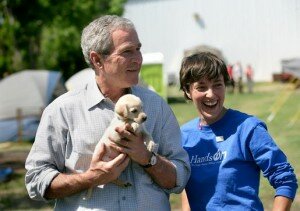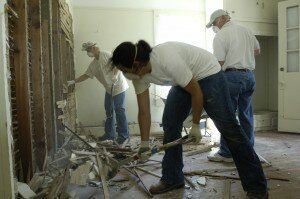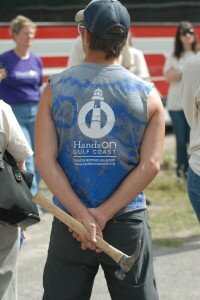 by Erika Putinsky
by Erika Putinsky
It is difficult to believe we are rapidly approaching the fifth anniversary of Hurricane Katrina.
As we relive the stories of the hurricane through media retrospectives that are sure to come this week, I am hopeful that we also remember the lessons learned while rebuilding the infrastructure, unmasking issues of disparity that have existed for hundreds of years, and supporting survivors as they create their new normal on the Gulf Coast.
This is our chance to truly, respectfully, and actively remember the loss, triumph, and continued need of the people of the Gulf Coast region.
 During my efforts with HandsOn Network on the Gulf Coast after Hurricane Katrina, I had the opportunity to live and work in a place where our nation truly came together as a unified community.
During my efforts with HandsOn Network on the Gulf Coast after Hurricane Katrina, I had the opportunity to live and work in a place where our nation truly came together as a unified community.
While I was in the disaster zone after Hurricane Katrina I was unsettled and amazed every minute of the day.
At no moment was it possible to escape bizarre sites like a delicate vase balanced atop a house that had been reduced to kindling, juxtaposed against the most beautiful sunset I had ever seen.
These unavoidable ironies hinted that Hurricane Katrina would continue to challenge us with unbelievable sadness and pure beauty for many years to come.
 Once the images of the despair and the stories of the survivors reached our world, people began to act.
Once the images of the despair and the stories of the survivors reached our world, people began to act.
It seems one of the most profound parts of the recovery was that we all got out from behind our veil of comfort and did what we could to help.
During that time, we were reminded the power of putting thoughts to task.
In Mississippi I met a 90 year old woman that drove 15 hours to volunteer because the hurricane gave her a reason to “still be on earth”.
She said she was a “real good cook” and explained nothing would help the survivors and volunteers feel better than a hot meal.
I saw residents that had lost everything riding dilapidated bicycles through debris filled streets while singing and wearing superhero costumes. They said they just wanted to create some happiness in the midst of the destruction.
 After the hurricane so many people remembered the power in showing up, being willing to help with a hammer to rebuild a home, or offer a hug to rebuild a life.
After the hurricane so many people remembered the power in showing up, being willing to help with a hammer to rebuild a home, or offer a hug to rebuild a life.
We are a world of heroes- we show up in times of great need and have the opportunity to live that heroism through continued action.
Now it is time to dust off our superhero capes, folks.
Let the fifth anniversary of Hurricane Katrina be a catalyst to remind the world to reflect on what can be with their minds, act on what should be with their hands, and continue to craft what will be with their efforts.
There are issues in every nation across the globe that we can solve with our ingenuity.
The Gulf Coast region still needs our help.
Perhaps, keep it local and volunteer at a nonprofit in your city.
You might even walk across the street and introduce yourself to a neighbor.
Show up, put your good thoughts to task and unleash your inner superhero!


 Apparently, so did a lot of other people, as suddenly I saw people in the online community running off to donate their hair to the oil spill clean-up efforts.
Apparently, so did a lot of other people, as suddenly I saw people in the online community running off to donate their hair to the oil spill clean-up efforts.

